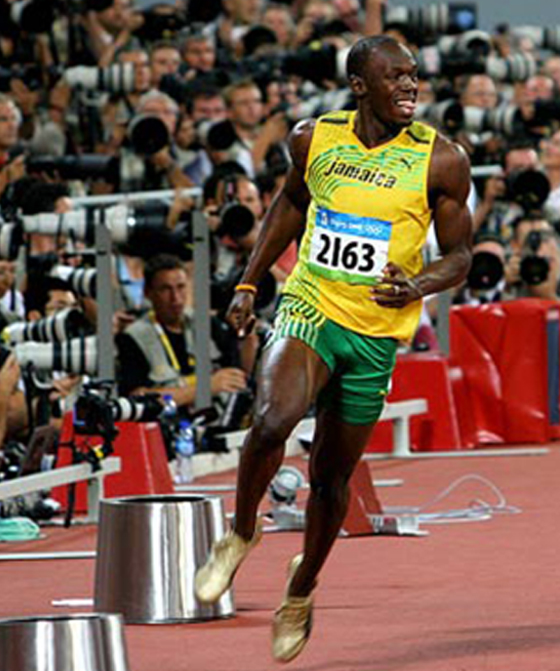Usain Bolt
Usain Bolt became the first man in Olympic history to win both the 100-meter and 200-meter races in world record times in 2008. Four years later, at the London Olympics, he became the first man to win gold medals in both the 100 and 200 at consecutive Olympic Games and the first man in history to set three world records in a single Olympic Games competition.
Synopsis
Jamaican sprinter Usain Bolt is arguably the fastest man in the world, winning three gold medals at the 2008 Olympic Games in Beijing, China, and becoming the first man in Olympic history to win both the 100-meter and 200-meter races in record times. Bolt won his fourth Olympic gold medal in the men's 100-meter race at the 2012 Summer Olympic Games in London, beating rival Yohan Blake, who took silver. Bolt ran the race in 9.63 seconds, a new Olympic record, making him the first man in history to set three world records in a single Olympic Games competition. The win marked Bolt's second consecutive gold medal in the 100. Bolt went on to compete in the men's 200, claiming his second consecutive gold medal in that race. He is the first man to win both the 100 and 200 at consecutive Olympic Games, as well as the first man to ever win back-to-back gold medals in double sprints.

Background
Usain Bolt was born in Jamaica on August 21, 1986. Both a standout cricket player and a sprinter early on, Bolt's natural speed was noticed by coaches at school, and he began to focus solely on sprinting under the tutelage of Pablo McNeil, a former Olympic sprint athlete. (Glen Mills would later serve as Bolt's coach and mentor.) As early as age 14, Bolt was wowing fans of sprinting with his lightning speed, and he won his first high school championships medal in 2001, taking the silver in the 200-meter race.
At the age of 15, Bolt took his first shot at success on the world stage at the 2002 World Junior Championships in Kingston, Jamaica, where he won the 200-meter dash, making him the youngest world-junior gold medalist ever. Bolt's feats impressed the athletics world, and he received the International Association of Athletics Foundation’s Rising Star Award that year and soon was given the apt nickname "Lightning Bolt."
Professional Career
Despite a nagging hamstring injury, Bolt was chosen for the Jamaican Olympic squad for the 2004 Athens Olympics. He was eliminated in the first round of the 200-meter, though, again hampered by injury.
Bolt reached the world Top 5 rankings in 2005 and 2006. Unfortunately, injuries continued to plague the sprinter, preventing him from completing a full professional season.
The year 2007 proved to be a breakthrough one for Bolt, as he broke the national 200-meter record held for over 30 years by Donald Quarrie, and earned two silver medals at the World Championship in Osaka, Japan. These medals boosted Bolt's desire to run, and he took a more serious stance toward his career.
Olympic Gold and World Records
Bolt announced that he would run the 100-meter and 200-meter events at the Beijing Summer Olympics. In the 100-meter final, Bolt broke the world record, winning in 9.69 seconds. Not only was the record set without a favorable wind, but he also visibly slowed down to celebrate before he finished (and his shoelace was untied), an act that aroused much controversy later on.
At the 2012 Summer Olympic Games, held in London, Bolt won his fourth Olympic gold medal in the men's 100-meter race, beating rival Yohan Blake, who won silver in the event. Bolt ran the race in 9.63 seconds, a new Olympic record. The win marked Bolt's second consecutive gold medal in the 100. He went on to compete in the men's 200, claiming his second consecutive gold medal in that race. He is the first man to win both the 100 and 200 in consecutive Olympic Games, as well as the first man to ever win back-to-back gold medals in double sprints. Bolt's accomplishments have made him the first man in history to set three world records in a single Olympic Games competition.
Accolades and 'Lightning' Pose
Following his 200 meters, in an interview with CBS News, Bolt detailed his pride over his 2012 performance: "It's what I came here to do. I'm now a legend. I'm also the greatest athlete to live. I've got nothing left to prove." Bolt took back the 100-meter world title on August 11, 2013, after having lost the title in 2011. Although Bolt didn't strike his signature "lightning bolt" pose after the race, his winning image still caused a stir, with lightning striking just as he crossed the finish line.
In 2015, Bolt faced some challenges. He came in second at the Nassau IAAF World Relays in May, but secured an individual win in the 200-meter event at Ostrava Golden Spike event that same month. He also dominated the 200-meter race at the New York Addias Grand Prix that June. But trouble with his pelvic muscles led him to withdraw from two races. Bolt, however, made a comeback that July with a 100-meter win at London's Anniversary Games. Still this elite runner is expected to face some stiff competition from American Justin Gatlin at the 2015 World Championships.
Bolt's achievements in sprinting have earned him numerous awards, including the IAAF World Athlete of the Year (twice), Track & Field Athlete of the Year and Laureus Sportsman of the Year. (http://www.biography.com)

No comments:
Post a Comment
Thanks It Reads and Never Leave Your Comments